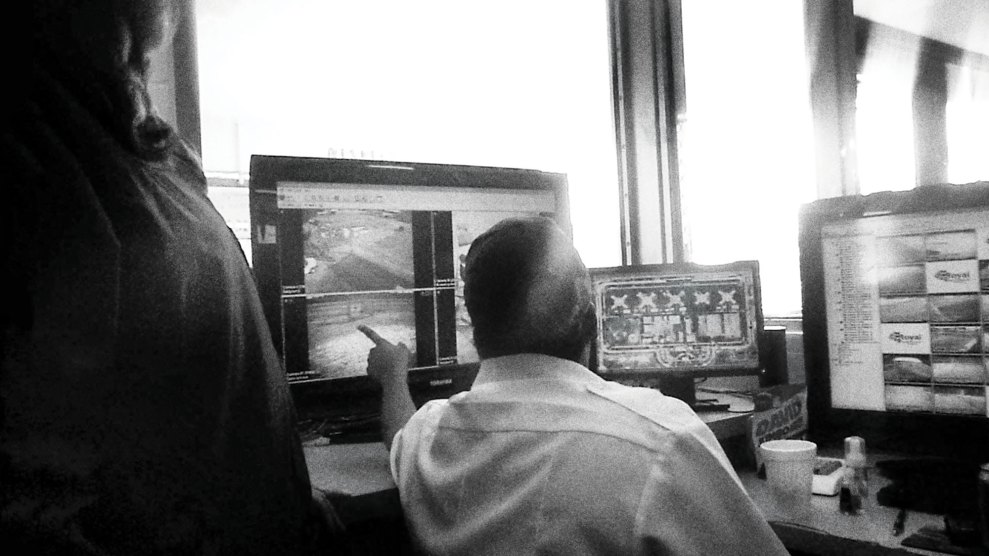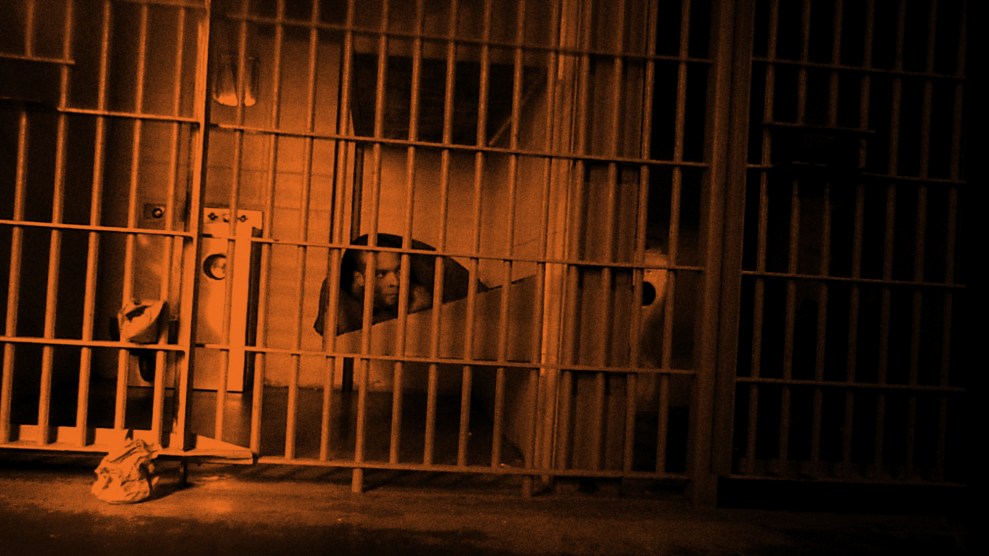In December 2014, Mother Jones senior reporter Shane Bauer started a job as a corrections officer at a Louisiana prison run by the Corrections Corporation of America (CCA), the country’s second largest private-prison company. During his four months on the job, Bauer would witness stabbings, an escape, lockdowns, and an intervention by the state Department of Corrections as the company struggled to maintain control. Bauer’s gripping, revelatory investigation is the cover story of Mother Jones‘ July/August 2016 issue.
Using his real name and personal information, Bauer applied for jobs at private prisons to get an inside look at the secretive industry that holds eight percent of America’s prisoners.* He was soon hired by CCA’s Winn Correctional Center, a medium-security prison that housed around 1,500 men. After four weeks of training, Bauer was placed in a unit where he and another officer were responsible for supervising more than 350 inmates. He was paid $9 an hour and routinely worked 12-hour days.
As a guard, Bauer got an unconstrained look at the workings of a private prison. Among the episodes and issues Bauer details in his article:
• Guards felt overworked and outnumbered. Metal detectors went unused. One of Bauer’s colleagues resorted to using two prisoners as unofficial “bodyguards.” Guards skipped required security checks and recorded checks that never occurred. As one guard in the segregation unit told him, “To be honest with you, normally we just sit here at this table all day long.”
• Louisiana paid CCA $34 per day for each prisoner at Winn. Staff-intensive activities such as work program and many vocational programs had been cut. Hobby shops were shuttered and the recreation yard and law library were often closed. “We just sit in our cells all day,” one inmate said. “What you think gonna happen when a man got nuttin’ to do?”
• A prisoner escaped, slipping past unwatched security cameras and guard towers that no longer had officers in them.
• “Believe it or not, we are required by law to take care of them,” Winn’s assistant warden said about inmates’ health needs. Yet one prisoner who had lost his legs and fingers to gangrene said his multiple requests for medical care had been ignored. (He’s suing CCA for neglect.) There were no full-time psychiatrists professionals on staff. Inmates with psychiatric issues often requested to be put on suicide watch, where they were held in segregation cells without a mattress or clothes.
• A rash of stabbings broke out, leaving inmates and guards fearing for their safety. Bauer witnessed incidents in which inmates attacked other inmates. CCA responded by sending in members of its Special Operations Response Team, a SWAT-like unit that kept order with shakedowns and pepper spray. These tactical officers “use force constantly,” Winn’s assistant warden told the guards, adding that, “I believe that pain increases the intelligence of the stupid, and if inmates want to act stupid, then we’ll give them some pain to help increase their intelligence level.”
• Eventually, the prison was put on an 11-day lockdown, and officials from the state Department of Corrections came in to monitor the prison. As one inmate told Bauer shortly after he came to Winn, “Ain’t no order here. Inmates run this bitch, son.”
Bauer’s article also includes profiles of guards and prisoners struggling to survive, “locked in battle like soldiers in a war they don’t believe in.” It also describes his reaction to the stress and risk of being a prison guard—a transformation that revealed the unsettling reality of one of America’s most difficult jobs. “More and more, I focus on proving I won’t back down,” he writes. “I am vigilant; I come to work ready for people to catcall me or run up on me and threaten to punch me in the face.”
Shortly after Bauer left Winn in March 2015, CCA announced that it was backing out of its contract to run Winn Correctional Center. Documents later obtained by Mother Jones show that the state had asked CCA to make numerous immediate changes at the prison, including filling gaps in security, hiring more guards and medical staff, and addressing a “total lack of maintenance.” Another concern was a bonus paid to Winn’s warden that “causes neglect of basic needs.”
Bauer’s article is the result of more than a year of reporting, writing, and fact checking. Read it here.
Bauer’s experience is also the subject of the upcoming episode of Reveal from The Center for Investigative Reporting and PRX airing on public radio stations across the country starting Saturday, June 25, and on the Reveal podcast on Monday, June 27.
*Correction: This figure has been changed to reflect the figure correctly reported in Bauer’s article and other accompanying pieces.













